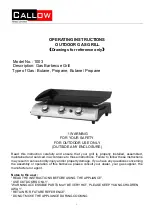
-3-
Demolition Hammer Safety Rules
Wear ear protectors when impact drilling.
Exposure to noise can cause hearing loss.
Use auxiliary handle(s) if supplied with the
tool.
Loss of control can cause personal injury.
Hold power tool by insulated gripping
surfaces, when performing an operation
where the cutting accessory may contact
hidden wiring or its own cord.
Cutting
accessory contacting a "live" wire may make
exposed metal parts of the power tool "live"
and could give the operator an electric shock.
Use clamps or another practical way to
secure and support the workpiece to a
stable platform.
Holding the work by hand
or against your body leaves it unstable and
may lead to loss of control.
Use a metal detector to determine if there
are gas or water pipes hidden in the work
area or call the local utility company for
assistance before beginning the operation.
Striking or cutting into a gas line will result in
explosion. Water entering an electrical device
may cause electrocution.
Always wear safety goggles or eye
protection when using this tool. Use a dust
mask or respirator for applications which
generate dust.
Safety goggles or eye
protection will help deflect fragments of the
material that may be thrown toward your face
and eyes. Dust generated or gases released
from the material you are cutting (i.e. asbestos
insulated pipes, radon) may cause respiratory
difficulties.
Use thick cushioned gloves and limit the
exposure time by taking frequent rest
periods.
Vibration caused by hammer action
may be harmful to your hands and arms.
Do not use dull or damaged bits and
accessories.
Dull or damaged bits have a
greater tendency to bind in the workpiece.
Always use both handles for maximum
control over this hammer. Never attempt to
operate this tool with one hand.
This tool
develops intense percussive forces during
operation and you may lose control if
attempting one hand operation.
Position yourself to avoid being caught
between the tool or side handle and walls
or posts.
Should the bit become bound or
jammed in the work, the reaction of the tool
could crush your hand or leg.
Do not strike the bit with a handheld
hammer or sledge hammer when
attempting to dislodge a bound or jammed
bit.
Fragments of metal from the bit could
dislodge and strike you or bystanders.
Disconnect the plug from the power source
and/or the battery pack from the power tool
before making any adjustments, changing
accessories, or storing power tools.
Such
preventive safety measures reduce the risk of
starting the power tool accidentally.
Store idle power tools out of the reach of
children and do not allow persons unfamiliar
with the power tool or these instructions to
operate the power tool.
Power tools are
dangerous in the hands of untrained users.
Maintain power tools. Check for misalignment
or binding of moving parts, breakage of
parts and any other condition that may
affect the power tool’s operation. If damaged,
have the power tool repaired before use.
Many accidents are caused by poorly
maintained power tools.
Keep cutting tools sharp and clean.
Properly
maintained cutting tools with sharp cutting
edges are less likely to bind and are easier to
control.
Use the power tool, accessories and tool
bits etc. in accordance with these instructions,
taking into account the working conditions
and the work to be performed.
Use of the
power tool for operations different from those
intended could result in a hazardous situation.
Service
Have your power tool serviced by a qualified
repair person using only identical
replacement parts.
This will ensure that the
safety of the power tool is maintained.
BM 1619929485 11-12_BM 1619929485 11-12 11/28/12 1:25 PM Page 3




































